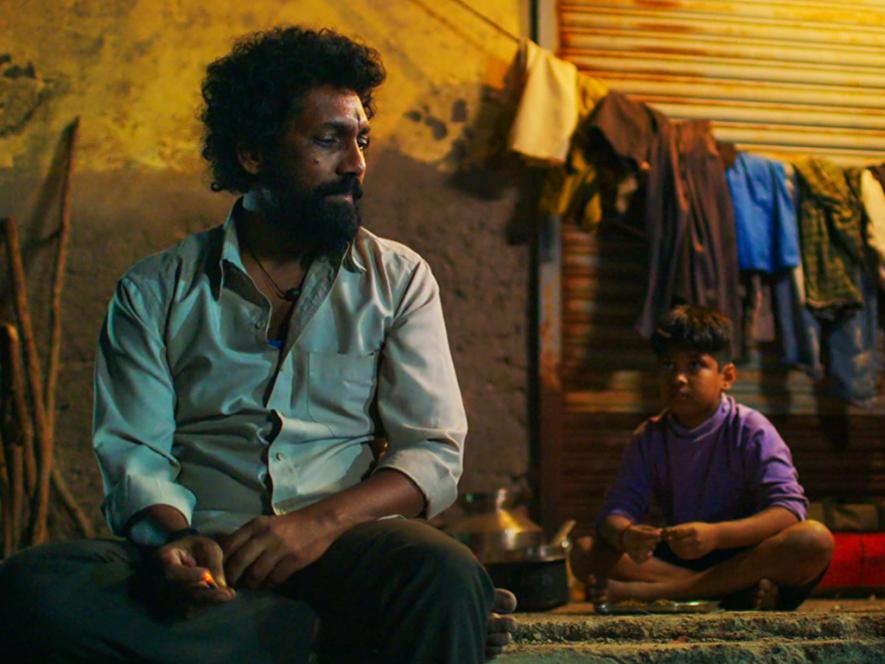Life Springs from Death in Nagraj Manjule’s Vaikunth

Still from ‘Vaikunth’, Unpaused: Naya Safar (2022) | Amazon Prime Video
“Those in hell are afraid of death, O King, for death is a condition that all those who have not seen the Dhamma (Buddhism) fear. Suppose, O King, a man kept prisoner in a dungeon were sent for by the King who wished to set him free. Wouldn’t that prisoner be afraid of meeting the King?”
“Yes he would.”
“Just so, O King, those beings in hell are afraid of death even though they will attain release from their torment.”
This is a dialogue between the Buddhist sage Nagasen and Menander, the Greek King who converted to Buddhism and became King Milind. Why did a ruler who had defeated many in battles and acquired territory after territory turn to Buddhism? At the core of Buddhist teachings lie the revelations that there is suffering in the world, that suffering is for a reason, that suffering can be overcome, and there is a way to overcome it. What, then, drew King Milind to Buddhism?
Watching the short film Vaikunth directed by Nagraj Manjule (streaming now on Amazon Prime as a part of the anthology titled Unpaused: Naya Safar) reminds me of the dialogue between Nagasen and King Milind cited above. Vaikunth is a visual parable with which one could—if conscious of the teachings of the Buddha and his science of life—begin to understand the brilliance of Nagraj Manjule as a director. The film also reminds me of how awestruck I was when I saw Kim Ki-duk’s Spring, Summer, Fall, Winter... and Spring, for the first time nearly a decade ago. It encouraged me to appreciate life before it gets replaced by death. It influenced how I started to view the world. But let me confess, all this took place at a subconscious level.
For the subconscious to be consciously revealed, I needed just half an hour of watching Vaikunth. So, I reiterate: a dalit man rejected and invisibilised by society is the one capable of creating life in the darkest of situations. And Vaikunth is the latest reminder of it.
Ask yourself, to which caste do the men who work in crematoriums belong? Vaikunth is the story of Vikas (played by Nagraj Manjule), who works in a crematorium. Death is not a new sight for men who do the work of cremating the dead, but in these pandemic-ridden times, emotions around death have acquired new meanings. The truth of life and its uncertainty seem to have been imposed on people by the pandemic, and Vikas witnesses both of these. His appetite is normal. He eats food surrounded by the bodies of the dead, some being burnt, some waiting for cremation. He is honest and prompt at work, doing everything with incredible emotional sensitivity.
However, arranging a funeral pyre for corpses, one after another, unabatedly carried in by ambulances also sparks a worry in Vikas. He is anxious about his father, who has caught Covid-19 and is admitted to a hospital that Vikas is not allowed to enter. He is asked to leave when he attempts to visit his father to check his condition. His personality and attire—as and of a male—are not socially acceptable. They create a sense of repulsion within the ‘sophisticated’ eyes of society. Then his landlord asks him to vacate his rented room. Amidst the raging pandemic and unmindful lockdown, he has nowhere to go. He and his little son, Avinash, receive no help from the people around them and are forced to leave their accommodation.
Eventually, it is at the crematorium where Vikas takes refuge with Avinash. The crematorium—from where people exit the world—becomes a shelter for father and son.
The subtext of this metaphoric convergence in the story of the film reflects the brilliance of Nagraj Manjule as director and storyteller. There is something poetic about this convergence, which profoundly affects the mind of the viewer. And yet, the viewer hardly possesses the language to feel what their experience means. Gradually, in front of the viewer, Vikas unfolds the emotional world of a man who works in a crematorium.
While setting up funeral pyres, Vikas worries about his father. He cherishes fond memories of his son playing with his grandfather. At the same time, he is scared to think about his father’s battle with Covid-19. Amidst these horrendous circumstances, he does not forget to sow the seeds of hope within his son’s tender mind. Despite his drinking, Vikas encourages his son to study and work hard and laments that in the absence of a good education, he would end up in the same miserable conditions as his, spending all his life in a crematorium. Light is the ultimate aspiration of those whose generations were often forced to succumb to the darkness. We know Vikas emphasises education instinctively, for he is surrounded by dead bodies day in and out.
In a crucial scene, an ambulance arrives. There are bodies in it, and Vikas pulls them out and arranges to cremate them, as he always does. The crematorium is where the Gaikwad (a dalit or possibly, a Maratha) and a Kulkarni (Brahman) become one. In the crematorium, all of them transform into ashes. Every day, Vikas witnesses this ultimate truth of life. The ambulance driver tells him he has carried his father in the ambulance and says he should take him out of it. For a very brief, poetic moment, Vikas thinks his father has arrived in the ambulance dead, a corpse. The very thought leaves him deeply dejected. He is saddened, yet he holds his own, sensibly not letting his feelings go berserk.
Seeing death and suffering is a part of his livelihood, so Vikas seems to have acquired an emotional maturity that comes with accepting the truth of death as a part of life. But at the moment when his father steps down from the ambulance, alive and hopeful, Vikas breaks into an unblemished smile. The smile indicates Vikas has not forgotten to cherish life, existence and loved ones despite working in a crematorium.
Vikas has not forgotten how to smile amidst the death all around him. He had seen prisoners of life fearful of meeting the King of death. And his smile is evidence that he has learnt a great deal about life and death through this process. Although he lives and works in the kingdom of death, Vikas has not forgotten to cherish life. Then, director Nagraj Manjule takes the movie to another level. In the climax, when all the Gaikwad and Kulkarni of the world become one, transformed into ashes, each inseparable and indistinguishable, they become agents who facilitate the arrival of life. We see the ashes of the dead being sprinkled on blooming crops and saplings as fertilisers in farms. Life continues, and so does the resistance of a man against the ugliness of society that rejected and despised him. He transforms into a mind capable of a beautiful creation that makes humanity grow. Nagraj Manjule has achieved new heights with Vaikunth. As a director, he completely erases the boundary between poetry and life.
The author is a poet, translator and founder of Panther’s Paw Publication, an anti-caste publishing house. He is pursuing a PhD at the Tata Institute of Social Sciences, Mumbai. The views are personal.
Get the latest reports & analysis with people's perspective on Protests, movements & deep analytical videos, discussions of the current affairs in your Telegram app. Subscribe to NewsClick's Telegram channel & get Real-Time updates on stories, as they get published on our website.
























